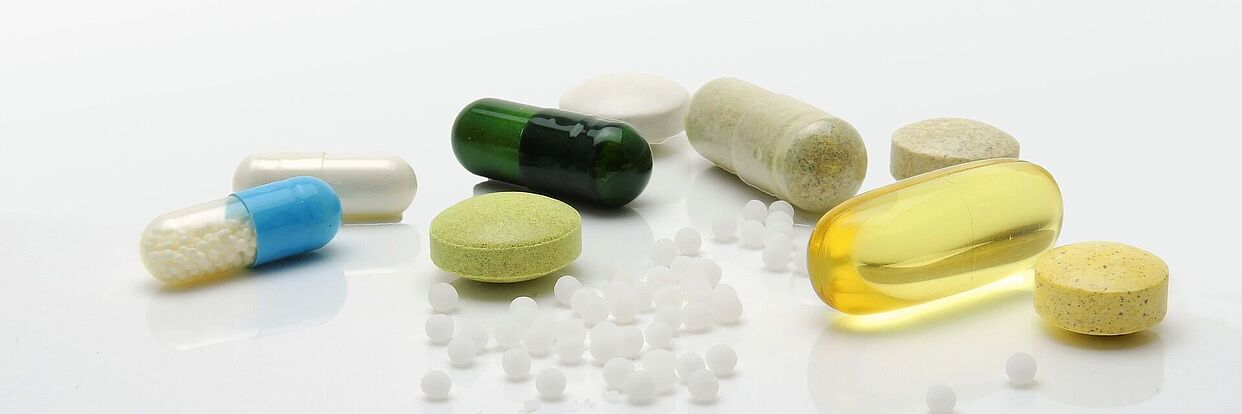

With its engineering and science-oriented teaching programme, the Master's degree programme in Pharmaceutical Process Engineering closes the gap between engineering-related process engineering and pharmacy. By combining these two areas, graduates are able to take on tasks at the transition between pharmacy and process engineering and thus combine the areas of research and production in a pharmaceutical company.
Documents related to the degree programme (admission regulations, examination regulations, module handbook, etc.) can be found on the Master's in Pharmaceutical Process Engineering documents page.
'Pharmaceutical Process Engineering' has replaced the old Master's degree programme 'Pharmaceutical Engineering'. All important documents from the old degree programme can be found here.
Standard period of study: 4 semesters | Degree: Master of Science (M.Sc.)
Application period: 1st June to 15th July for the winter semester, 1st December to 15th January for the summer semester
further information ...
The Master's degree programme in Pharmaceutical Process Engineering is particularly suitable for graduates of the degree programmes in Biological, Chemical and Pharmaceutical Engineering (Bachelor), Pharmaceutical Engineering (Bachelor) and Pharmacy (after the second section of the pharmaceutical examination, "Staatsexamen"). However, all other degree programmes whose curriculum includes at least 50 credit points in process engineering and/or pharmaceutical modules are also eligible for admission to this degree programme.
The selection committee decides on the subject-specific allocation of modules and thus on admission to the Pharmaceutical Process Engineering degree programme.
The number of students is limited to 25 per year. If more applicants fulfil the admission requirements, a ranking list is drawn up in accordance with the admission regulations and the most suitable applicants are admitted until the available places for the semester in question are filled.
The Pharmaceutical Process Engineering degree programme is a highly interdisciplinary degree programme that is primarily taught by lecturers from the Faculty of Mechanical Engineering and the Faculty of Life Sciences (Chemistry and Pharmacy). This ensures a diverse curriculum and training by experts in the respective areas.
The degree programme is divided into different areas: Compulsory area, core area, compulsory elective area, interdisciplinary electives and the final module (Master's thesis).
If the content of modules in the core area is known from the bachelor's degree programme, either the credit points are transferred to the compulsory elective area or – in the case of a bachelor degree programme with more than 180 credit points (without practical semester) – the credits are recognised, which can lead to a shortening of the master's degree programme. Modules from the compulsory elective area can also be recognised. In the case of the 2nd State Examination in Pharmacy ("zweites Staatsexamen Pharmazie"), which has a standard period of study of 8 semesters, up to 55 credit points, i.e. almost half of all the necessary credits, can be recognised if you specialise in "Pharmaceutical Research", thus shortening the course to two semesters.
An overview of the Master's degree programme is shown in the following diagram. For further information, please refer to the in-depth structure of the degree programme.
This degree programme offers a wide range of opportunities to expand and deepen existing skills and qualifications in the field of process engineering and pharmacy. By introducing two specialisations, 'Pharmaceutical Engineering' and 'Pharmaceutical Research', students can specialise in different areas of pharmaceutical process engineering:
The specialisation must be chosen before the start of the degree course in order to generate an individual study plan. All students can choose from both specialisations. It is possible to change the specialisation during the degree course, but in this case a new curriculum must also be created.
This area, which is located in a late phase of the study programme, offers the opportunity to incorporate personal interests, inclinations and skills. In addition to process engineering and pharmaceutical subjects, it also includes subjects from other areas such as microtechnology or business administration.
The modules available in the compulsory and compulsory elective areas can be found in Annex 1 and Annex 2 of the examination regulations (BPO).
This area consists only of the module "Research Qualification" (Forschungsqualifikation). In this module, students work in groups to write an English-language review article on a pharmaceutical process engineering topic and present the results in the form of a poster.
In addition, a language course (English B2) must be taken as part of the module (see module handbook). Together, the contents of this area form a common, interdisciplinary basis in which knowledge and competences are imparted that are required for later professional practice in the pharmaceutical industry and/or pharmaceutical research.
The compulsory area is very small, so that students have more freedom of choice in the direction of their studies. It only contains two modules: "Data Analysis in the Pharmaceutical Sciences" (Datenanalyse in den Pharmazeutischen Wissenschaften) and "Quality Management in the Pharmaceutical Industry" (Qualitätswesen in der Pharmazeutischen Industrie). All students must take these two modules.
The core area is divided into a general section and the chosen specialisation. This section contains all fundamental modules for the Pharmaceutical Process Engineering degree programme and for the respective specialisation. The fundamentals of the chosen specialisation must be heard. The core area contains many modules, some of which are already known, depending on the Bachelor's study programme. As described above, credit points from known modules from the core area can be transferred to the compulsory elective area or the modules can even be recognised.
The final module consists of the Master's thesis and a presentation. The Master's thesis has a scope of 28 CP and includes the written processing of a task including literature research. It concludes with a presentation (2 CP) of the results obtained after a processing period of 6 months. Both sub-modules must be passed separately.
Only students who have passed all examinations in the compulsory and compulsory elective areas and have demonstrably completed all coursework can be admitted to the Master's thesis. The Master's thesis can also be completed in a company.